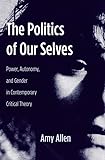The Politics of Our Selves : Power, Autonomy, and Gender in Contemporary Critical Theory / Amy Allen.
Material type: TextSeries: New Directions in Critical Theory ; 43Publisher: New York, NY : Columbia University Press, [2007]Copyright date: ©2007Description: 1 online resource (248 p.)Content type:
TextSeries: New Directions in Critical Theory ; 43Publisher: New York, NY : Columbia University Press, [2007]Copyright date: ©2007Description: 1 online resource (248 p.)Content type: - 9780231136235
- 9780231509848
- 126
- BD450 .A4723 2008
- online - DeGruyter
- Issued also in print.
| Item type | Current library | Call number | URL | Status | Notes | Barcode | |
|---|---|---|---|---|---|---|---|
 eBook
eBook
|
Biblioteca "Angelicum" Pont. Univ. S.Tommaso d'Aquino Nuvola online | online - DeGruyter (Browse shelf(Opens below)) | Online access | Not for loan (Accesso limitato) | Accesso per gli utenti autorizzati / Access for authorized users | (dgr)9780231509848 |
Frontmatter -- Contents -- Acknowledgments -- 1. Introduction -- 2. Foucault, Subjectivity, and the Enlightenment -- 3. The Impurity of Practical Reason -- 4. Dependency, Subordination, and Recognition -- 5. Empowering the Lifeworld? -- 6. Contextualizing Critical Theory -- 7. Engendering Critical Theory -- Concluding Reflections -- Notes -- Bibliography -- Index
restricted access online access with authorization star
http://purl.org/coar/access_right/c_16ec
Some critical theorists understand the self as constituted by power relations, while others insist upon the self's autonomous capacities for critical reflection and deliberate self-transformation. Up to now, it has all too often been assumed that these two understandings of the self are incompatible. In her bold new book, Amy Allen argues that the capacity for autonomy is rooted in the very power relations that constitute the self. Allen's theoretical framework illuminates both aspects of what she calls, following Foucault, the "politics of our selves." It analyzes power in all its depth and complexity, including the complicated phenomenon of subjection, without giving up on the ideal of autonomy. Drawing on original and critical readings of a diverse group of theorists, including Michel Foucault, Jurgen Habermas, Judith Butler, and Seyla Benhabib, Allen shows how the self can be both constituted by power and capable of an autonomous self-constitution. Her argument is a significant and vital contribution to feminist theory and to critical social theory, both of which have long grappled with the relationship between power and agency.If critical theory is to be truly critical, Allen argues, it will have to pay greater attention to the phenomenon of subjection, and will have to think through the challenges that the notion of subjection poses for the critical-theoretical conception of autonomy. In particular, Allen discusses in detail how the normative aspirations of Habermasian critical theory need to be recast in light of Foucault's and Butler's account of subjection. This book is original both in its attempt to think of power and autonomy simultaneously and in its effort to bring the work of Foucault and Habermas into a productive dialogue.
Issued also in print.
Mode of access: Internet via World Wide Web.
In English.
Description based on online resource; title from PDF title page (publisher's Web site, viewed 02. Mrz 2022)


